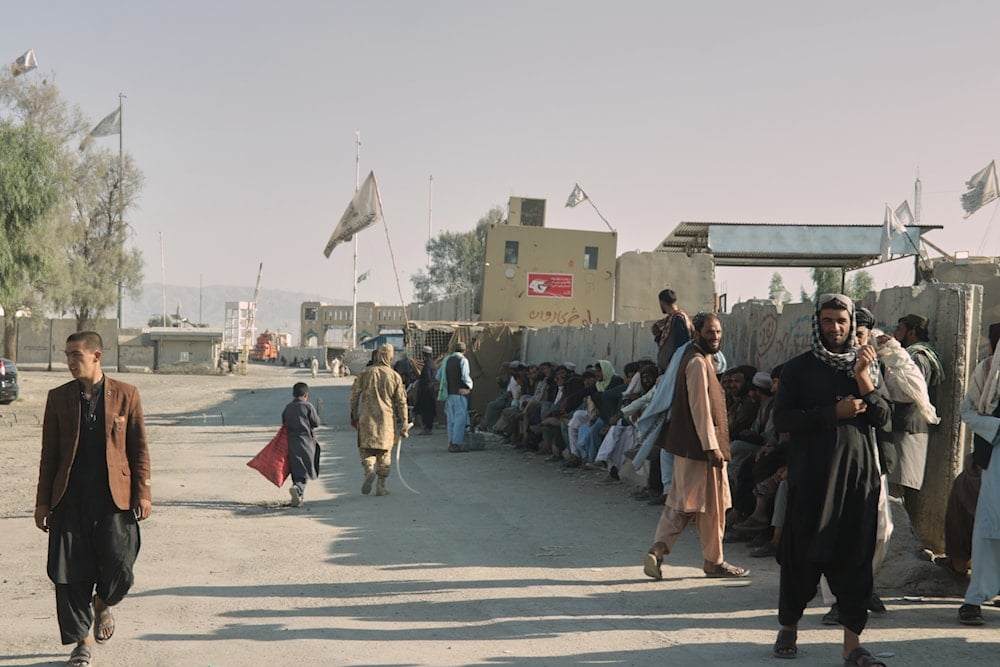Pakistan threatens to 'obliterate' Taliban after peace talks fail
Pakistan’s defense minister threatens to "obliterate" the Taliban after ceasefire talks collapse in Istanbul, with tensions still escalating following deadly border clashes.
-

People wait near the closed gate at the Spin Boldak border crossing with Pakistan, after the border was shut for nearly two weeks following clashes between Afghan and Pakistani forces, in Kandahar province, Afghanistan, October 23, 2025. (AP Photo/Sibghatullah)
Tensions between Pakistan and the Taliban have sharply escalated following the collapse of ceasefire negotiations aimed at de-escalating violence along the Pakistan-Afghanistan border. Talks held in Istanbul, mediated by Turkey and Qatar, ended without a breakthrough, prompting a fierce response from Pakistan's leadership.
Pakistan’s Defense Minister Khawaja Asif issued a stark warning on Wednesday, saying the Taliban government could be "completely obliterated" if the conflict continues.
"Pakistan does not require to employ even a fraction of its full arsenal to completely obliterate the Taliban regime and push them back to the caves for hiding," Asif said on X.
While on the request of brotherly countries who were persistently being beseeched by Taliban Regime, Pakistan indulged in talks to give peace a chance, venomous statements by certain Afghan officials clearly reflect the devious and splintered mindset of Taliban regime.
— Khawaja M. Asif (@KhawajaMAsif) October 29, 2025
Let me…
Pakistan accuses Taliban of harboring militants
A Pakistani security source said the Taliban leadership in Kabul told Reuters that they had refused to commit to reining in the Pakistani Taliban (TTP), a separate militant group responsible for recent attacks on Pakistani security forces. Islamabad has long accused the Taliban of providing a haven to TTP militants operating along the 2,600-kilometer frontier.
A source familiar with the Istanbul discussions said talks ended after “tense exchanges,” with the Afghan side claiming it had no control over the TTP. Pakistani Information Minister Attaullah Tarar accused the Taliban of deflecting from core issues and engaging in a "blame game."
“The Afghan side kept deviating from the core issue ... on which the dialogue process was initiated,” Tarar said in a statement. "The dialogue thus failed to bring about any workable solution."
Despite a ceasefire brokered in Doha on October 19, violence has continued to erupt along the border. Earlier this month, Pakistani airstrikes had targeted locations in Kabul and other Afghan areas in pursuit of TTP leaders, triggering retaliatory attacks by Taliban forces on Pakistani military posts.
The weekend clashes that followed left five Pakistani soldiers and 25 Pakistani Taliban militants dead, according to the Pakistani military. The border remains officially closed. "Failure to reach a deal in Istanbul will mean open war," Khawaja Asif warned in an earlier statement.
This comes after efforts to broker a lasting ceasefire between Afghanistan and Pakistan have failed, as talks held in Istanbul concluded without resolution. The breakdown in dialogue marks a setback for regional stability following the deadliest cross-border violence since the Taliban assumed power in Kabul in 2021.
A Pakistani security source told Reuters the talks faltered because the Taliban refused to take responsibility for curbing the activities of the Pakistani Taliban, a separate militant group hostile to Islamabad that operates within Afghan territory.

 3 Min Read
3 Min Read










